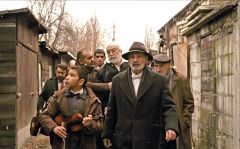53rd THESSALONIKI INTERNATIONAL FILM FESTIVAL
November 2- 11, 2012
PRESS RELEASE
BALKAN SURVEY
For the 19th consecutive year, the Balkan Survey section of the Thessaloniki International Film Festival (TIFF), programmed by Dimitri Kerkinos, showcases a selection of the most important Balkan films of the year. The Balkan Survey objective is to create a communication platform between films and filmmakers of the area and international audiences. This year’s Balkan Survey core program consists of 13 films, both shorts and features.
A Tribute to Romanian director Cristian Mungiu will complement the main program of this year’s Balkan Survey. Mungiu will attend the 53rd TIFF and a book on his work will be published by the Festival, with essays and film critiques.
BALKAN SURVEY CORE PROGRAM
The feature films that constitute the main program of the Balkan Survey section, works by renowned filmmakers of the region as well as promising newcomers, are:
 When Day Breaks by Goran Paskaljevic (Serbia/Croatia/France). An elderly music professor receives an invitation to his local Jewish museum, where he learns an unexpected and harsh truth about his family and its Jewish history. A moving film about discovery, identity and knowing oneself, shot in close-ups and largely built around a nuanced performance by lead actor Mustafa Nadarevic, When Day Breaks is Serbia’s entry for the 2013 Foreign Language Academy Award.
When Day Breaks by Goran Paskaljevic (Serbia/Croatia/France). An elderly music professor receives an invitation to his local Jewish museum, where he learns an unexpected and harsh truth about his family and its Jewish history. A moving film about discovery, identity and knowing oneself, shot in close-ups and largely built around a nuanced performance by lead actor Mustafa Nadarevic, When Day Breaks is Serbia’s entry for the 2013 Foreign Language Academy Award.
Zeki Demirkubuz’s Inside (Turkey), a remarkable adaptation of Fyodor Dostoyevsky’s “Notes From The Underground”, is a portrait of a man plunged in the darkest recesses of human nature. The anti-hero, Muharrem, teetering on the edge of madness, is an archetypical marginal figure at war with the world and himself. Inside won five awards at this year’s Istanbul IFF, including Best Director and Best Actor for Engin Gunaydin.
Two women directors, Aida Begic (Bosnia) and Maja Milos (Serbia), with Children of Sarajevo and Clip respectively, examine the effect of the post-war trauma on the region’s younger generations. Children, the story of an orphaned sister and brother who live in Sarajevo, looks at the struggle of building even the simplest of lives. Clip, winner of the Tiger and KNF Awards at this year’s Rotterdam IFF, explores the nihilism of the mobile generation through the story of a teenage girl, who, faced with a bleak family life and minimal prospects for the future, resorts to an escapist existence, fuelled by drugs, sex and destructive relationships.
Radu Jude’s Everybody in Our Family (Romania) is a brilliant black comedy, centering on a newly single father on the edge, who is trying to cope with the novel realities of divorce and joint custody of his young daughter. Night of Silence by Reis Celik (Turkey), on the other end of the spectrum tonally and thematically, is a very different “family film”. Minimalist, subtle and contemplative, it observes the first night of a strange and unsettling couple: an older man fresh out of jail, and his 14-year-old bride, brought together in an arranged union created to put an end to a blood feud. Finally, the Turkish-Greek production Beyond the Hill by first-time director Emin Alper (a participant in the 51st TIFF Crossroads co-production forum and the 52nd TIFF Works in Progress section) is a tense family drama set in an isolated grazing area in rural Turkey. Nomads that bring their goats beyond the hills threaten a family’s livelihood; the outside hazard, however, also reveals hidden truths about the family itself. Beyond the Hill won the Caligari Prize at the 62nd Berlin Film Festival.
In addition, 6 short films will be screened, amongst which is the 2012 Cannes IFF Palm d’ Or winner, Turkish film Silent, directed by L.Rezan Yesilbas, which depicts the struggle of a Kurdish woman who wants to visit her husband in prison. Romanian Adrian Sitaru’s House Party is a film about the particular rules and ethics of people living next to each other, seen through the relationships of an apartment building’s neighbors. 30-40-50-, holding its international premiere in the 53rd TIFF, is directed by three women filmmakers belonging to the newest generation of Romanian cinema, while Turkish film Musa by Serhat Karaaslan, stars renowned director Zeki Demirkubuz.
FEATURE FILMS:
Beyond the Hill (Terenin ardi), Emin Alper, Turkey/Greece, 2012, 94’
Children of Sarajevo (Djeca), Aida Begic, Bosnia & Herzegovina /Germany/France/Turkey, 2012, 90’
Clip (Klip), Maja Milos, Serbia, 2012, 102’
Everybody in Our Family (Toata lumea din familia noastra), Radu Jude, Romania, 2012, 107’
Inside (Yeralti), Zeki Demirkubuz, Turkey, 2012, 107’
Night of Silence (Lal gece), Reis Celik, Turkey, 2012, 91’
When Day Breaks (Kad svane dan), Goran Paskaljevic, Serbia/Croatia/France, 2012, 90’
SHORT FILMS:
Can I Drive Daddy? (Oci, lahko jaz sofiram?), Miha Hocevar, Slovenia, 2012, 14’
House Party (Chefu), Adrian Sitaru, Romania, 2011, 18’
Musa, Serhat Karaaslan, Turkey, 2012, 18’
The Ornament of Soul (Ornament duse), Irena Jukic-Pranjic, Croatia, 2011, 10’
Silent (Be deng), L.Rezan Yesilbas, Turkey, 2012, 14’
30-40-50, Iulia Rugina, Eva Pervolovici & Stanca Radu, Romania, 2012, 25’
CRISTIAN MUNGIU TRIBUTE
 Romanian director Cristian Mungiu, whose entire body of work will be screened during the 53rd TIFF, is one of the foremost representatives of the Romanian New Wave. In 2007, when he received the Palme d’ Or at the Cannes IFF for 4 Months, 3 Weeks and 2 Days, a worldwide discussion of (and admiration for) contemporary Romanian cinema had just been established. Mungiu, who has referred to his beginnings as “a time when saying something about the system was more important than telling a story”, shares with his contemporaries’ their need to record and reveal the realities of their country and its troubled recent past; nevertheless, he has his own distinctive approach to filmmaking.
Romanian director Cristian Mungiu, whose entire body of work will be screened during the 53rd TIFF, is one of the foremost representatives of the Romanian New Wave. In 2007, when he received the Palme d’ Or at the Cannes IFF for 4 Months, 3 Weeks and 2 Days, a worldwide discussion of (and admiration for) contemporary Romanian cinema had just been established. Mungiu, who has referred to his beginnings as “a time when saying something about the system was more important than telling a story”, shares with his contemporaries’ their need to record and reveal the realities of their country and its troubled recent past; nevertheless, he has his own distinctive approach to filmmaking.
Mungiu’s short films, starting with Mariana in 1997, are a fascinating specimen of his work; they are quite diverse from his feature oeuvre. In these first efforts at directing, all of which are quite accomplished, Mungiu shows a funnier streak; there is also an element of surrealism to most of these films: an Italian and a Russian conversing in their respective languages without understanding each other over a coffin in The Fireman’s Choir; the characters on television that talk directly to the obsessive protagonist in Zapping. Furthermore, the short film Turkey Girl (2005) will be screened as the seventh episode of the Tales of the Golden Age omnibus film, exactly in the manner it was first presented in Romania.
The foundations of Mungiu’s naturalistic, anthropocentric cinema can be found in his shorts, but the director seems to have solidified his ideas, current style and approach after his first feature, Occident, in 2002. His films are not emotional, yet they stir intense reactions. They focus on the small stories of everyday people, which significantly reflect the society around them. Mungiu passes no judgment, but explores decisions and actions, as, in his cinematic universe, they are the only recourse against the plights of life and the predicaments originating from various corrupt forms of authority.
Beyond the Hills, his masterful latest film, again revolves around a duo of girls united by a deep friendship. Voichita and Alina, who grew up together in an orphanage, have followed different paths in life; Voichita has become a nun and Alina has arrived to the monastery to persuade her to return with her to the outside world. As in all of Mungiu’s work, the crooked values of the figures of authority in the film (here, not just the church, but the health and foster systems) are testing the only honest, pure relationship in the film, the one between its two heroines. Mungiu’s –and cinematographer Oleg Mutu’s- long-take approach, as well as the constricted feeling produced by their superb use of framing and spaces, have reached their apex in the telling of the story. Beyond the Hills won the Awards for Screenplay and Best Actress -ex aequo for its two protagonists, Cosmina Stratan and Cristina Flutur- in the 2012 Cannes IFF and is Romania’s entry for the 2013 Foreign Language Academy Award.
FEATURE FILMS:
Beyond the Hills (Dupa dealuri), 2012, 151’, Romania/France/Belgium
Tales of the Golden Age (Amintiri din epoca de aur), 2009, 155’, Romania
4 Months, 3 Weeks and 2 Days (4 Luni, 3 saptamini si 2 zile), 2007, 113’, Romania
Occident, 2002, 105’, Romania
SHORT FILMS:
Turkey Girl, 2005, 20’, Romania (screened with Tales of the Golden Age)
The Fireman’s Choir (Corul Pompierilor), 2000, 30’, Romania
Zapping, 2000, 15’, Romania
Nothing by Chance (Nici o intamplare), 1999, 17’, Romania
The Hand of Paulista (Mana lui Paulista), 1998, 15’, Romania
Mariana, 1997, 16’, Romania















